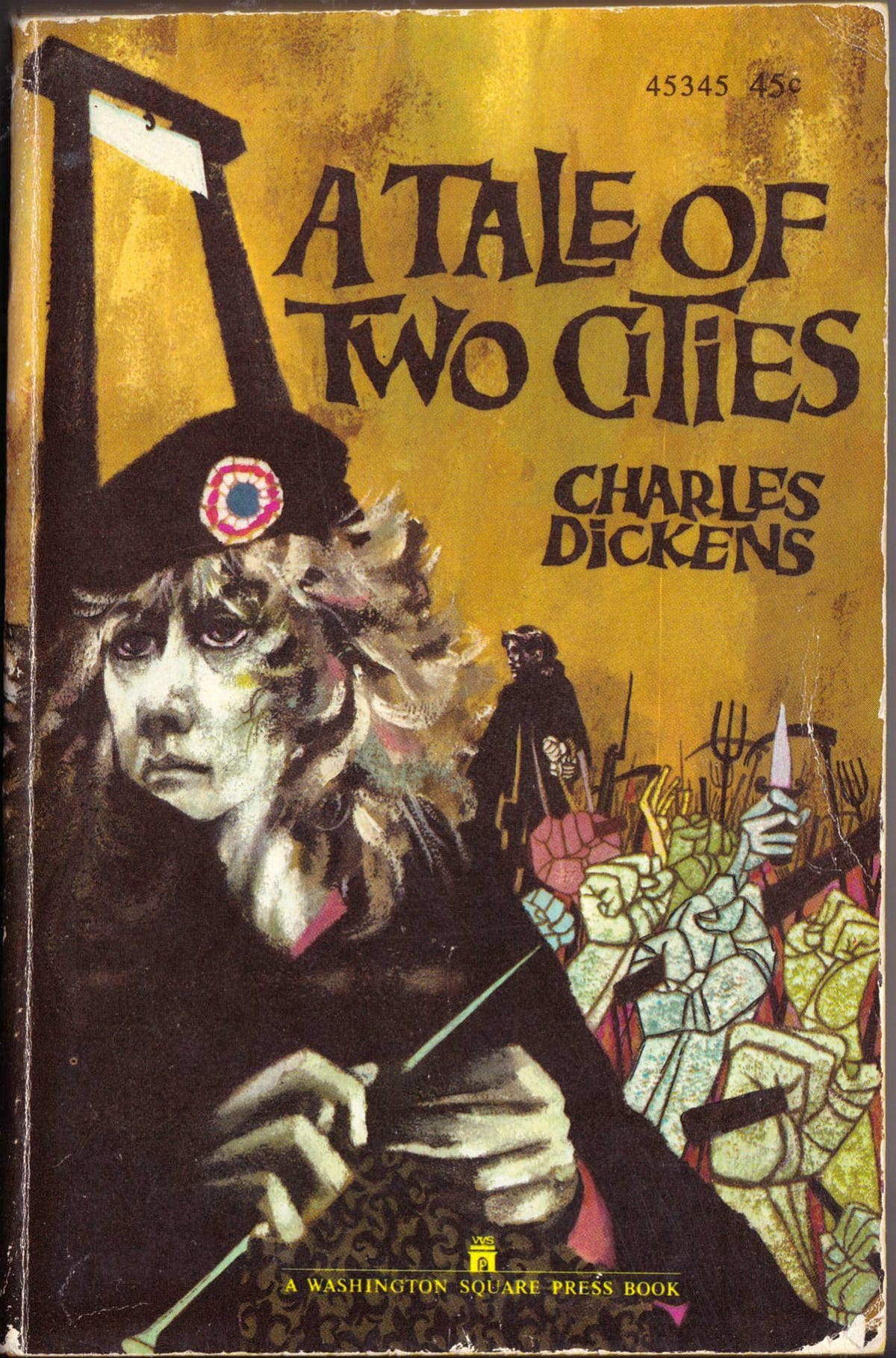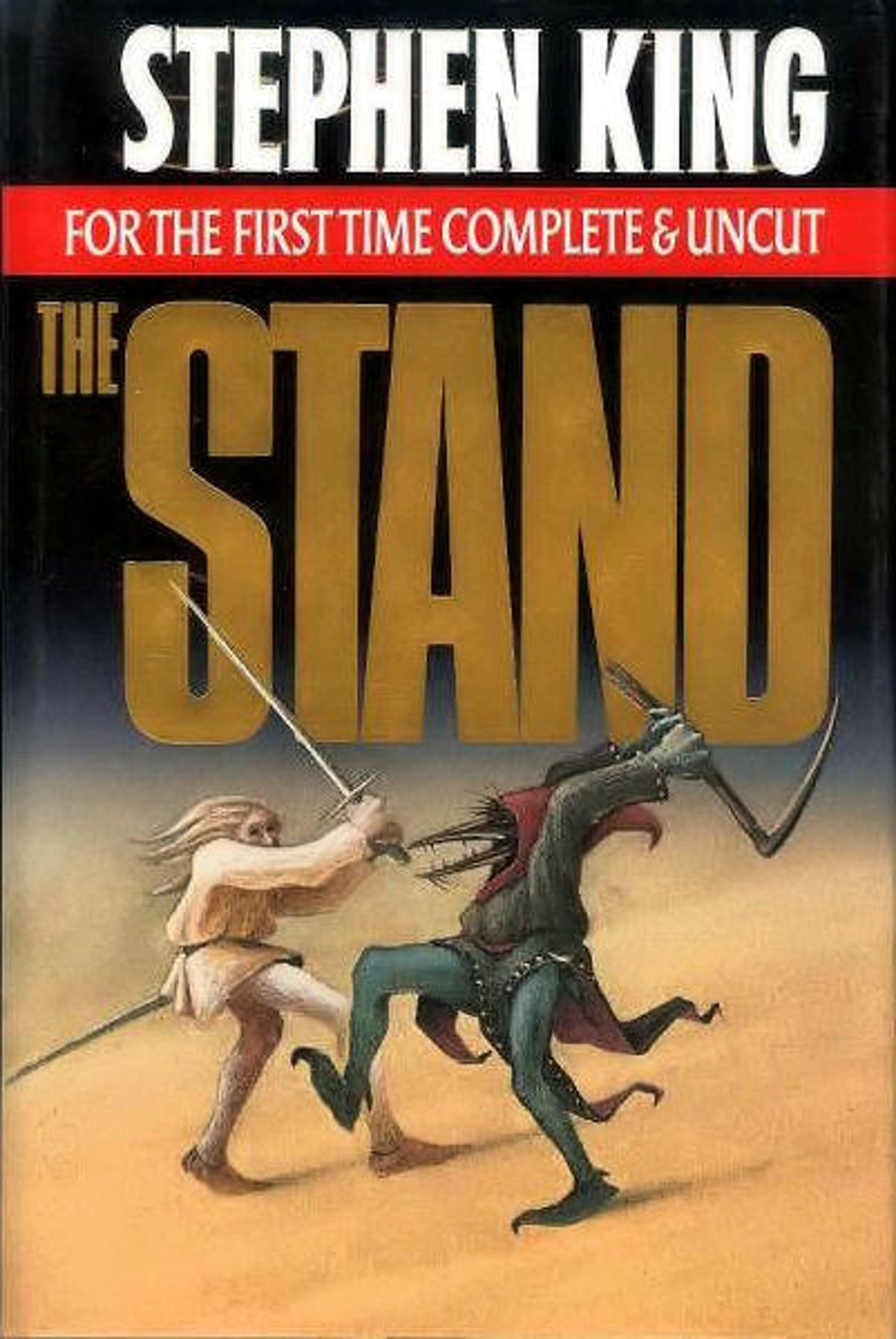Our favorite books of all time
Every week we ask people around the office questions to see what makes them tick. This week we wanted to know which books they read that rose above all the rest.

'A Tale of Two Cities' - Charles Dickens (1859)
Editor's note: Every week we ask people around the office questions to see what makes them tick. This week we wanted to know which books they read that rose above all the rest. We also had them send the covers they remember from when they read them.
Written in the 19th century about events in the 18th century, "A Tale of Two Cities" still maintains a "modern" tone and the themes expressed seem more relevant than ever given the state of things going on now. I could wax poetic about why this is my and my wife's favorite, but the opening speaks for itself:
"It was the best of times, it was the worst of times, it was the age of wisdom, it was the age of foolishness, it was the epoch of belief, it was the epoch of incredulity, it was the season of Light, it was the season of Darkness, it was the spring of hope, it was the winter of despair, we had everything before us, we had nothing before us, we were all going direct to Heaven, we were all going direct the other way ..." Amazing.
- Jon Chaikin - senior manager, direct marketing & merchandising
'The Great Gatsby' - F. Scott Fitzgerald (1925)
I bought a bargain bin copy of "The Great Gatsby" when I was 15 and tore through it in a day. At the time, I remember thinking that I hadn't encountered a better command of the English language. But beyond that, I loved how certain lines or certain paragraphs just stopped me dead because they were so evocative or so beautiful. I still reread it every couple years -- it never fails to bring back the feelings of wistfulness and melancholy I had the first time around.
- Erin Carson - staff reporter
'Gravity's Rainbow' - Thomas Pynchon (1973)
It's almost as hard to explain "Gravity's Rainbow" as it is to read it, but what a wild ride when you can figure out what's going on. You have a main character, Slothrop, who ends up on a quest through the aftermath of World War II in Germany, looking for a mysterious artifact of the war. You have British and Russian agents, a German rocket scientist and Captain Blicero, the rocket group commander in charge of the secretive S-Gerat and rocket 00000. There's also an immortal lightbulb, an overgrown adenoid and an octopus psychologically conditioned by the British. I love the inventive and messy nature of "Gravity's Rainbow," and as satisfying as it is to read, I can't quite tell you what it means.
- Wayne Cunningham - senior editor

'The Stand' - Stephen King (1978)
"The Stand" is the classic good versus evil story set in a world where 99 percent of the population has died of the flu. Though I enjoy the finely drawn characters and the journey each person takes through this new world, what I really like is the reforming of society. The book deals extensively with politics, economics, law and culture in a way that's fascinating. It makes me wonder what I would do if most of the world's people suddenly died. Would I join up with other survivors or just submit to my inner hermit and find a beach house somewhere?
People think of Stephen King as a horror writer, and there are plenty of scary bits in "The Stand," but on the whole it's more suspenseful than anything else. To this day I can't reread the chapter about a character walking through the Lincoln Tunnel in total darkness to escape New York City. He has to climb over crashed cars full of dead bodies. Reading about his ordeal is incredibly stressful.
- Emme Hall - reviews editor
'The Hitchhikers Guide to the Galaxy' - Douglas Adams (1979)
"The Hitchhikers Guide to the Galaxy" is a bit of a nerdy choice, yes. And maybe not even my "favorite" book (who could possibly choose?), but it was the first book I took seriously enough to read more than once, after originally being exposed to it by a slightly subversive fourth-grade teacher. (Wait, that doesn't sound right ... )
Today, as an author myself, I'm more likely turn to something by Elmore Leonard, Walter Mosley or Richard Price, but Douglas Adams nailed a perfect mix of ridiculousness and mock seriousness (it's fitting that he was also a writer and script editor on "Doctor Who" in the '70s). I've never forgotten the book's two most important lessons: Always know where your towel is, and don't panic!
- Dan Ackerman - section editor
'Ball Four' - Jim Bouton (1970)
It'd be tough to pick just one book as my all-time fave, but a strong contender would have to be "Ball Four," a diary of the 1969 baseball season chronicled without apology by pitcher Jim Bouton. Bouton had been a star on the Yankees in the early '60s, but by this time his fastball had long since left him and he was trying to make a comeback as a knuckleball pitcher on the shortlived Seattle Pilots, so "Ball Four" recounts their travails. (Trivia: The expansion Pilots existed as such for only one season before they were sold and moved to Milwaukee, where they became the Brewers.)
Bouton's journal is funny, touching and quite frank, and it caused much uproar among his fellow players as well as baseball management, as he was seen to have violated the sacred confidence of the locker room; for several years after Bouton was considered a pariah in baseball circles. Fans, however, ate it up. It gave them a look at the real characters of the game, not just what happened between the foul lines, and the book became required reading for any and all lovers of the game.
I got my copy when I was in the seventh grade via one of those Scholastic classroom book sales schemes that schools would run to encourage reading, and I remember having to bring a note from my parents before the school would allow me to order such "mature" material. I reread it numerous times over the next eight years or so, and I still try to read it it every few years at the beginning of baseball season.
- Jim Hoffman - copy editor
'In Cold Blood' - Truman Capote (1966)
Though the content isn't light reading by any stretch of the imagination,"In Cold Blood" is undoubtedly one of my favorite books of all time. It is a true-to-life account of a quadruple murder that took place in western Kansas in 1959. So it's certainly not a happy subject, but the way Truman Capote slowly exposes the sequence of events that occurred and details the psychologies of the murderers and major players in the subsequent investigation is exquisite.
- Jason Parker - senior editor
'The Secret History' - Donna Tartt (1992)
The campus friends in "The Secret History" are murderers, but you forget that when you spend close to 600 pages in their eccentric, charming, bizarre company. They're classics majors in snowy Vermont (at a college based on Bennington), and though the murder is confessed on page one, there's an eerie sense of mystery as Tartt meticulously unwinds the paths that led them there. I'm so obsessed with this book that I've cast the movie in my head multiple times -- "L.A. Confidential"-era Guy Pearce would make an ideal Henry Winter, and no one can tell me otherwise.
- Gael Fashingbauer Cooper - contributing editor
'Pride and Prejudice' - Jane Austen (1813)
I have to say "Pride and Prejudice" by Jane Austen. I love period pieces with a British accent, especially if the main character is an independent, smart and witty young woman who speaks her mind and doesn't let tradition overwhelm her or guide her life. I must have reread this book more times than I actually know. I read it first translated to Spanish and ventured to read the English original edition a few years later. I learned all kinds of not-that-useful words for daily life in the 21st century, such as "twelvemonth" or "fortnight".
I even have read "Pride and Prejudice and Zombies," and I have to say the best parts are the Austen bits, but Seth Grahame-Smith's idea was brilliant. Oh, and naturally, I am a big fan of the BBC miniseries with Colin Firth. Best Mr. Darcy choice ever.
- Patricia Puentes - editor, CNET en Espanol
'Lonesome Dove' - Larry McMurtry (1985)
Retired Texas Rangers moving a herd of cattle from South Texas to Montana doesn't exactly sound like a thrill ride. But in "Lonesome Dove," Larry McMurtry's ability to craft so many unique characters and create incredible chemistry between them makes this thousand page epic go by in a flash.
I laughed out loud a whole lot during "Lonesome Dove." I also got weepy more than once ... I usually try to avoid getting weepy. There is no shame in getting weepy to "Lonesome Dove."
- Nic Henry - video producer
'The Lion, the Witch and the Wardrobe' - C.S. Louis (1950)
"The Lion, the Witch and the Wardrobe," the first in the "Chronicles of Narnia" series, made me believe at a very young age that all wardrobes and closets must have a hidden door somewhere leading to a secret world full of wonder and danger. I love how the book takes place during WWII. Four young siblings must work together to save a majestic lion and his followers from an evil witch who turns her enemies into stone statues. The book opened my mind to mythical creatures and stunning worlds but also reminded me that sometimes you should never underestimate the power of family.
- Bonnie Burton - contributing editor
'Where the Wild Things Are' - Maurice Sendak (1963)
It might be a children's book, but it's so good, I have to go with "Where the Wild Things Are." I vividly remember running around as a kid pretending to be Max, in my imaginary wolf suit. The book instantly captured my imagination and I fell in love with the idea of having an island to myself, inhabited by scary but playful beasts. Plus, I got to be Queen.
- Danielle Ramirez - senior production manager

